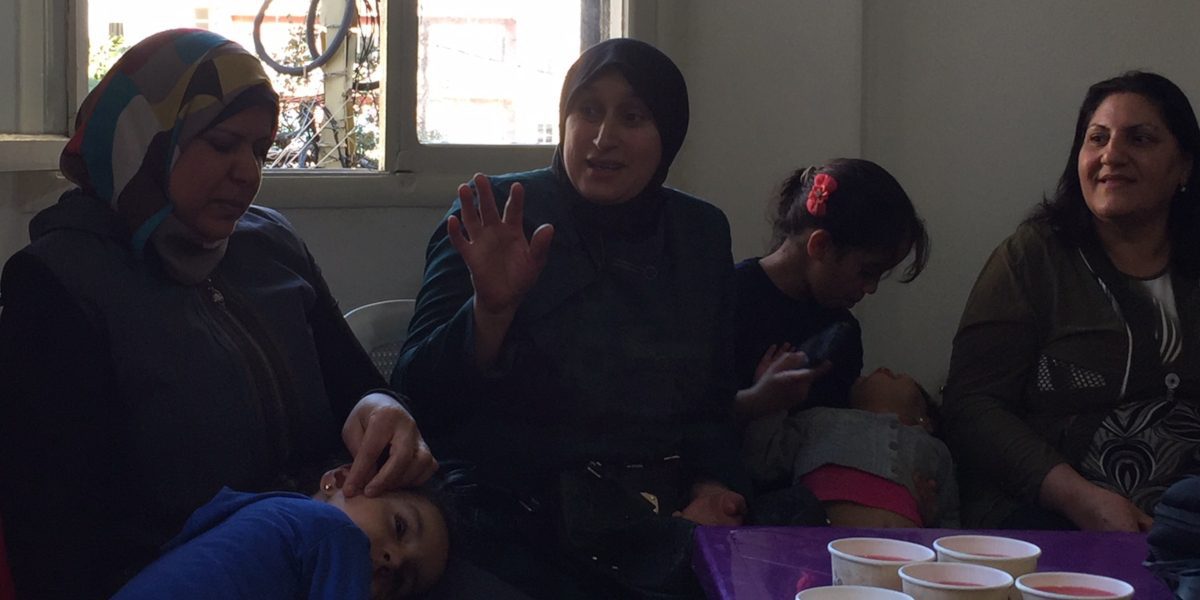Lebanon: Hang Tighter Onto Life
16 May 2019

Beirut – The Jesuit Refugee Service (JRS) has implemented a new monitoring and evaluation technique, Most Significant Change (MSC), which focuses on the outcomes and impact of our services through stories of change. MSC enables the invaluable stories and experiences of refugees to shape their futures and improve the work JRS is doing. It allows us to accompany refugees on their journey, walking beside them and hearing their stories.
At a recent MSC workshop in Lebanon, Noor, a Syrian refugee, reflected on the impact JRS’s services had on her life.
I tried to commit suicide twice. The first time I threw myself into the sea. The second time I took painkillers. I survived anyway.
My main problem at the time was my mother in law. She terrified me. I was constantly haunted by the idea that she was going to kill me. I could not eat any meal cooked by her, thinking she had poisoned it. When the war started, my husband decided to move to Lebanon. When every other person was scared and terrified of the war, the war for me provided the needed escape and distance from my mother in law.
When we moved to Lebanon we lived in a very small room, and things got crazier for me. I was far away from my mother in law, but I was suffocating in a three metre room. We could not go out because of our financial problems; we were living in stress, so I tried to commit suicide a third time, but still managed to survive. This is when my neighbors introduced me to JRS. I started therapy sessions. Things got better, and I was recovering and regaining hope in life. One day, while I was breastfeeding him, my son told me “Mama there is a balloon in your breast.” The doctor confirmed my suspicion: “I have breast cancer.”
Financially the situation was very hard, and going back to Syria was impossible. Having managed to collect the money for the operation, I still needed chemotherapy sessions and medications. However, we couldn’t afford it.
We were the only Syrian family in the neighborhood, and our neighbors knew our situation well. So some of them left money under the doorstep and others bought my medications. I also cut my hair and sold it, but the money I received for it would barely cover the cost of a single chemotherapy session. The kids ultimately picked up on our dire situation and wanted to sell their toys and clothes to help. My husband and the kids surprised me one day when they returned home with shaved heads! My youngest son told me, “Look mama, we all look like you now! We all look the same!”
The care I found at home when I was sick was beyond belief, the whole atmosphere changed. My husband and I got closer. My kids started helping with household chores and behaved better at school. They became more serious and started studying harder. Hope and ambition filled their hearts with plans to become doctors.
On my son’s birthday, I mustered all the power I had and went to get him a cake. I wanted to live every moment with them. I started loving life more, I wanted to live at least for my little boy. He was still too young to survive without a mother. I needed to live for him. I now appreciate each moment. Sunrises and sunsets have more value. A cup of coffee with my husband has a special taste.
When I finally recovered from cancer, I decided to overcome my fear and call my mother in law to see how she was doing. JRS, through the psychologist, helped me to overcome many of my problems and issues, insecurities and depression. Their accompaniment during my sickness was all the support I needed.



